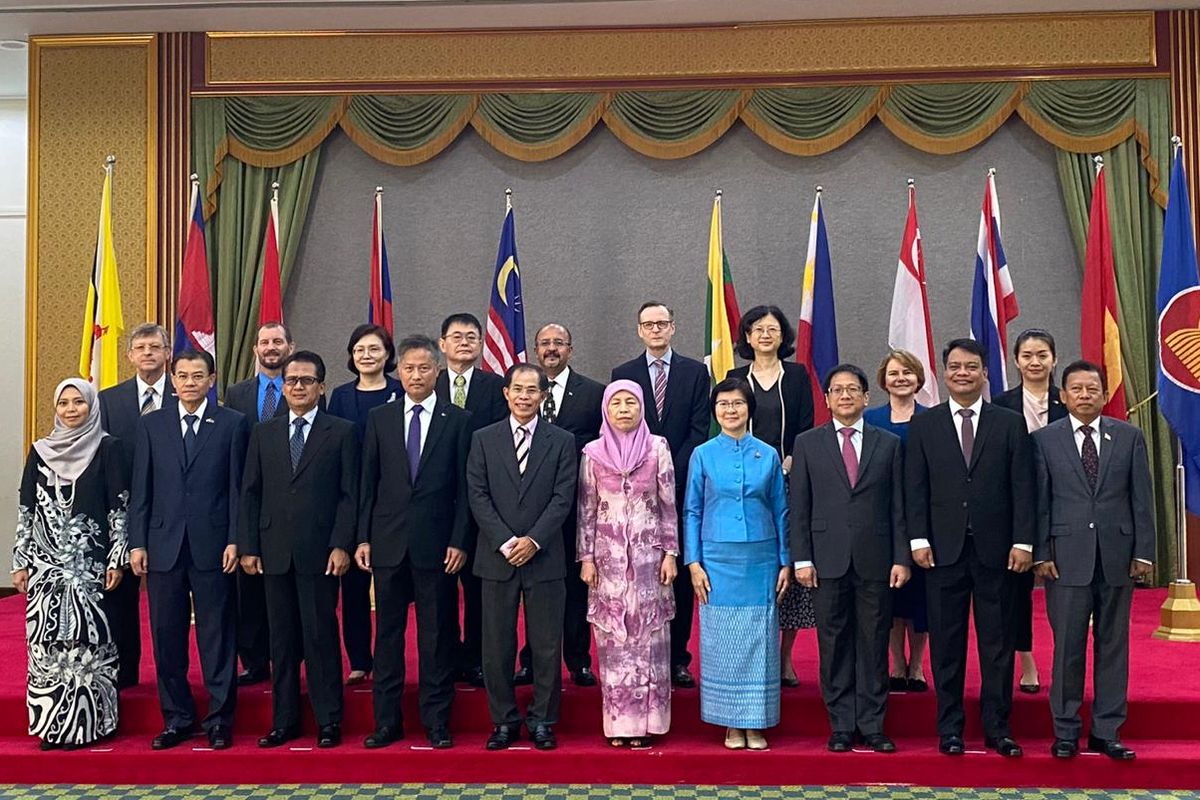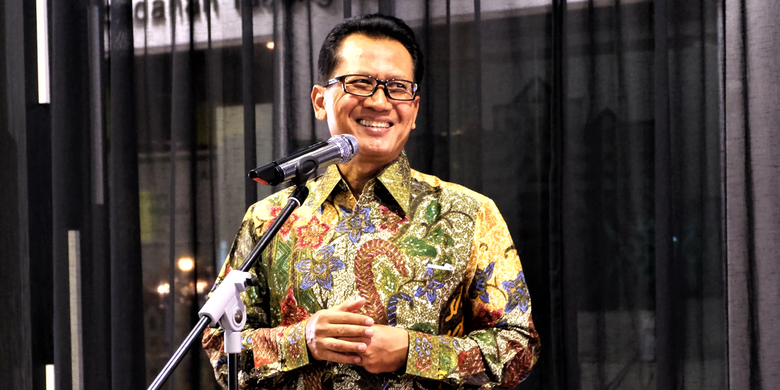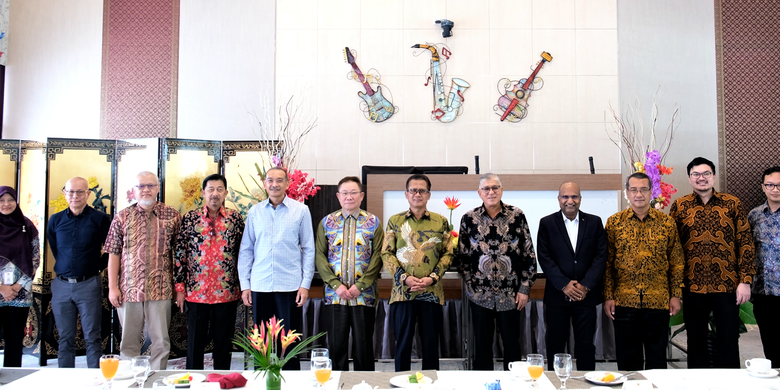Brunei Darussalam's ASEAN Chairmanship: Indonesian Envoy Lauds Brunei’s Response to Covid-19

KOMPAS.com – The Association of Southeast Asian Nations (ASEAN) chairmanship in 2021 has been handed over to Brunei Darussalam from Vietnam amid global uncertainty caused by the Covid-19 pandemic.
Despite the severe challenges, Brunei has expressed its commitment to continue to improve regional recovery and address current issues together with the ASEAN Community under this year’s theme of “We Care, We Prepare, We Prosper.”
ASEAN groups Brunei, Cambodia, Indonesia, Laos, Malaysia, Myanmar, the Philippines, Singapore, Thailand, and Vietnam.
Indonesia’s Ambassador to Brunei Darussalam Dr. Sujatmiko shared his views on the Brunei chairmanship, the initiatives taken by the regional bloc to curb the spread of the Covid-19, and the commitment of Indonesia to support Brunei as the chair of ASEAN to assure the well-being of the people in Myanmar.
The following are excerpts from Kompas.com’ s exclusive e-mail interview with the envoy:
As Indonesia’s Ambassador to Brunei Darussalam, could you share with us how is the implementation of this year’s ASEAN meetings under the Brunei chairmanship amid the Covid-19 pandemic?
In the second semester of last year, Brunei indicated that ASEAN meetings would be held via videoconference. The decision has provided certainty for substantive and logistic preparation of the meetings for Brunei and the other ASEAN Member States. Brunei also announced that the ASEAN Summit would only be held once and back-to-back from October 26-28. So far, all virtual meetings have been well conducted. But, of course, the meetings were done without lobbying during coffee breaks, sideline meetings, and activities to promote the host country.
However, the intensity of communication has been moved into the digital arena and it has indeed opened another opportunity for ASEAN, that is, the acceleration to embrace digital transformation and technology.
I believe the Brunei chairmanship would be very vital despite the Covid-19 pandemic, which provides both challenges and opportunities for the region. Besides, several geopolitical challenges are faced by ASEAN as well, such as the current situation in Myanmar and on-going tension in the South China Sea, which are very delicate issues faced by the ASEAN.
In the current condition as most of the meetings are held virtually, are there any programs to replace the common sideline activities such as tree planting, cultural and tourism events, and award ceremony?
I believe all of us agree that it is important to engage the local community to promote people’s awareness and understanding of ASEAN, which in turn will greatly contribute to the success of ASEAN as a community. Unfortunately, there have not been any programs to replace these community activities due to the current condition. Now with the recent Bruneian government policies to ease social-distancing measures particularly the lifting of mass gathering restriction from a maximum limit of 350 up to 1,000 people, hopefully, we will have community programs at least to celebrate the anniversary of ASEAN in early August.
Will there be face-to-face meetings during the second half of 2021?
 Indonesia's Ambassador to Brunei Darussalam Dr. Sujatmiko delivers his speech during a gathering with Indonesian migrant workers in the Sultanate on September 26, 2020.
Indonesia's Ambassador to Brunei Darussalam Dr. Sujatmiko delivers his speech during a gathering with Indonesian migrant workers in the Sultanate on September 26, 2020. Brunei Darussalam has decided to convene all ministerial meetings and other meetings below the ministerial level virtually this year. Therefore, from my point of view, it is very unlikely for us to have face-to-face meetings until the end of this year. On this matter, I believe the Brunei government will take into consideration the development of the pandemic situation as well as the coverage of mass vaccination programs throughout all ASEAN Member States.
Nevertheless, we at the Embassy, stand ready should there be a decision in convening an ASEAN meeting in physical format.
What are the programs that have been done or will be done in your role as Indonesia’s Ambassador to Brunei and one of the ambassadors in the ASEAN country to enhance the unity of the people in this regional bloc?
Currently, we are in talks with the Ministry of Youth, Culture, and Sports, Ministry of Foreign Affairs, other ASEAN Member States Missions in Brunei, and with the Brunei Music Society (BMS) to hold a joint cultural performance in the second semester of 2021 in conjunction with the Brunei Darussalam chairmanship. Hopefully, through culture, the event would help build bridges for greater understanding among the ASEAN citizens. Furthermore, I am also in discussion with other ambassadors to organize sports events and social gatherings to enliven Brunei Darussalam's chairmanship.
During the recent informal ASEAN Ministerial Meeting, all ASEAN foreign ministers and a representative of the Myanmar military representative attended the meeting and discussed the current development in Myanmar. What is your view on the response of the ASEAN member states to bring peace and prosperity to Myanmar?
ASEAN Member States’ common response was clear with the convening of the Informal ASEAN Ministerial Meeting on March 2. We shared the same concern over the situation in Myanmar. ASEAN has also expressed its willingness to assist Myanmar in getting out of this situation. Indonesia plays its part to ensure that ASEAN as a big family will not leave nor isolate Myanmar. Indonesia continues to support Brunei Darussalam as the current chair to take steps in assuring the safety of the people of Myanmar and restoring normal conditions in Myanmar, as it is the wish and in the interests of the people of Myanmar.
What steps will be taken by the Member States to curb the spread of Covid-19 in this region?
There are a lot of initiatives under the ASEAN framework to not only curb the spread of the Covid-19 in the region but also to recover from its unprecedented crisis in many areas. The steps taken on ASEAN initiatives are, among others, implementing the ASEAN Comprehensive Recovery Framework and its Implementation Plan, utilizing the Covid-19 ASEAN Response Fund, including preparing its use on the procurement of vaccines, operationalizing the ASEAN Regional Reserve of Medical Supplies for Public Health Emergencies (RRMS) and working on the ASEAN Plus Three RRMS, and establishing the ASEAN Centre for Public Health Emergencies and Emerging Diseases and ASEAN Travel Corridor Arrangement Framework.
Could you tell us the state of bilateral relations of Indonesia with Brunei Darussalam and how you see it developing over the coming years?
 Indonesia's Ambassador to Brunei Darussalam Dr. Sujatmiko (6th from right) posing for a photo with business community in the Sultanate on July 11, 2020.
Indonesia's Ambassador to Brunei Darussalam Dr. Sujatmiko (6th from right) posing for a photo with business community in the Sultanate on July 11, 2020. Close relations and mutual trust have underpinned relations between Indonesia and Brunei Darussalam for the last 37 years. We have established diplomatic relations since 1984 and, with sharing similarities in religion, culture, and language, our bilateral ties keep getting stronger. This would be our initial capital to gain more out of the relations for ultimate goals, that is, peace and prosperity for our peoples. For example, our two-way trade volume has significantly increased since 2017. Last year, despite the Covid-19 pandemic, Indonesian products exported to Brunei (livestock, coconut oil, chemical products, and household appliances) increased significantly by 52.81 percent or reached $204.3 million. And I am optimistic that we will continue to repeat the same success this year.
During my three-year assignment in Brunei Darussalam, one thing I learned is that despite its relatively small size, the Brunei market offers the big potential to be tapped into and should not be overlooked. Together with my team, we keep on exploring potential products and businesses to be offered to business people of both countries.
Your Excellency, is there anything that you would like to add?
There is more to Brunei than the chairmanship of ASEAN. I think one needs to look further to learn what Brunei can offer. Not many know that Brunei is one of the countries that handle the Covid-19 pandemic best. It has been free from Covid-19 local transmission for more than 300 days. With the current in-and-out-country travel restrictions policy, people living in Brunei have entered the new normal with anxiety-free.
Brunei is also taking seriously another occurring challenge, climate change. It has forest cover constituting seventy-two percent of its land area. Nevertheless, efforts of tackling climate change keep accelerating. At the end of last year, Brunei has submitted its National Determined Contribution targeting a reduction in greenhouse gas by 20 percent relative to Business-As-Usual levels by 2030 and since then, Brunei has taken steps to realize this commitment.
For Indonesia, Brunei has so many potentials to offer, to learn from and we can cooperate to gain the mutual benefit for the people of the two countries.
This interview has been edited for length and clarity.
Simak breaking news dan berita pilihan kami langsung di ponselmu. Pilih saluran andalanmu akses berita Kompas.com WhatsApp Channel : https://www.whatsapp.com/channel/0029VaFPbedBPzjZrk13HO3D. Pastikan kamu sudah install aplikasi WhatsApp ya.

































